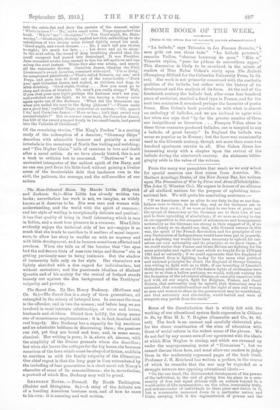SOME BOOKS OF TIIE WEEK.
[Notice in this cottnn does not necessarily yrectuds stassoiont ronfcw.1 "La ballade," says Trissotin in Les Fcnzmes Seven les," h mon goat eat une chose fade." "La ballade pourtant," remarks Vadins, "eharme beancoup de gene." " Bile a," Triesotin replies, "pour lee pddans de meereilleux appal." This discussion is likely to be re-echoed in the minds of readers of Miss Helen Cohen's study upon The Ballade (Humphrey Milford for the Columbia University Press, 7s. 641. net), Her work is not primarily concerned with the aesthetic qualities of the ballade, but rather with the history of its development and the analysis of its form. At the end of the fourteenth century the ballade had, after some four hundred years of evolution, reached a fixed type in Prance, and for the next two centuries it remained perhaps the favourite of poetic forms. Miss Cohen's book provides us with what is almost an anthology of balladea, and we are inclined to agree with her when she says that "by far the greater number of them are insignificant as literature. . . Francois Villon alone in these three centuries produced ballades, one is tempted to any a ballade, of great beauty." In England the ballade was never so popular as in France ; but the form was occasionally used in the fifteenth century, though not more than some two hundred specimens survive in all. Miss Cohen tiloses her interesting study with a chapter upon the revival of the ballade during the nineteenth century. An elaborate biblio- graphy adds to the value of the volume.


































 Previous page
Previous page